| |
"I was lying somewhere in the Scottish Highlands on a very squeaky hotel bed, trying to get some sleep after a long day of shooting, when I received a Facebook message from Geoff Beran, moderator of the Brian De Palma news blog De Palma à la Mod. I leaned over in the dark and was greeted by two words lit up on my iPhone's lock screen: "Well, wow." My gut instinct told me that Geoff would have a good reason to contact me, and boy did he ever." |
| |
Peet Gelderblom, freelance film director * |
It's a great behind the scenes story. Working Dutch director/editor, Peet Gelderblom reads an interview with director Brian De Palma discussing his original script and the intentions of his less than well received movie Raising Cain and then boldly sets about recreating the director's original vision. Posting his re-edit online, De Palma gets wind of it and announces his enthusiasm. A director's cut performed by another director but hey... Editing; the arrangement of the scenes, the shots and when to hold, when to cut, when to include, when to excise... Editing is not fully appreciated by the lay-man but it can change a film's emotional effect so radically as it has done so here. There is no significant difference in the running time of both cuts and with the exception of a mix here and there and some repeated shots, the blocks are more or less intact but the difference between both edits is emotionally immense. In the Theatrical, you're hit in the face with a frying pan and you sort of accept it. In the Director's Cut, there're twenty-two minutes of infidelity drama in which to get invested and then you break both ankles on the rug pull. Why De Palma thought the theatrical was more commercial is beyond me. The Director's Cut is infinitely more satisfying. It's true that the experience of Raising Cain is fundamentally altered by the creation of the Director's Cut. And hand on heart, I'm quite pissed off I watched the Theatrical Cut first... Although I am somewhat amused by the fact of there being two versions of a film about a man with a split personality.
It is almost impossible for me to talk about the movie without spoiling left, right and centre so from here on in, I will be addressing plot points and events that you may want to avoid to fully let the movie surprise you. So in conclusion in the spoiler-free territory of this paragraph, Raising Cain is a real curio but if you want the emotional punch and shock at full blast, throw away the Theatrical Cut! From now on, here be spoilers...
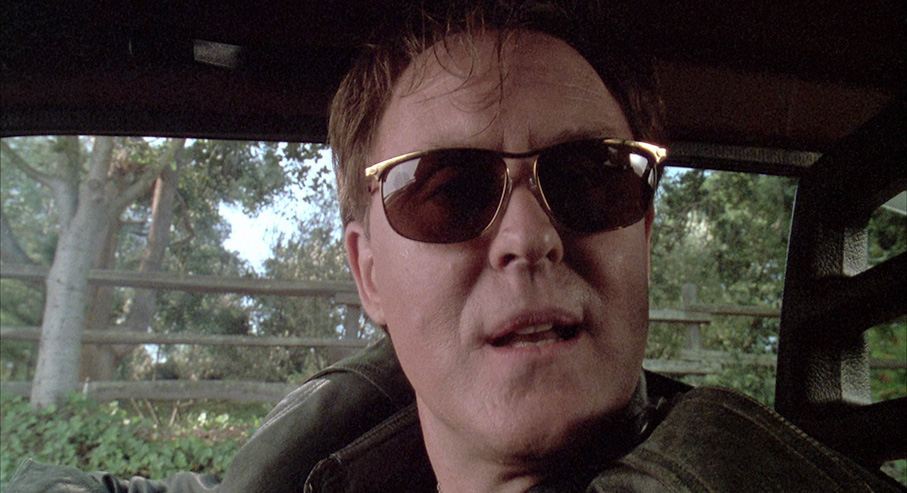
Let's go back in time... On my word of honour, at time of writing most of this paragraph, I was halfway through my first viewing of a De Palma movie that passed me by in the early 90s, I had not pre-researched the film in any way. All I knew about it was the title, the poster, the director and John Lithgow. Beyond that, I was and halfway, still am, its narrative virgin. The movie so far is a real one-off, which is both positive and negative. Directors who really pour their intellect and fertile imagination into their films must know that Joe Schmoe from Idaho (sorry, Idaho but on the plus side, you do rhyme with Schmoe) is not going to 'get' it. There are narrative elements in the Theatrical Cut that echo Hitchcock (it's De Palma, make a goddamn list) but also you get a sense that De Palma may be using sleight of edit to lead us down the garden path and we may be missing all the flowers. Right, back to the present day.
After a trawl through Fight Club last night and with M. Night Shyamalan's Split opening this month, I seem to be encountering a small wave of personality disorder movies. The plot of the theatrical version of Raising Cain is relatively straightforward (it does, of course, depend on which version you watch). Dr. Carter Nix (John Lithgow) seems like a devoted father. Many people tell his wife how 'perfect' he is so you just know he's the murderer (hardly a spoiler, look at the poster!) But he is also psychotically driven to be just lovely to harassed mothers, chloroform and kill them in order to get access to their kids who are then served up to his long-thought dead father to research multiple personality disorders in his secret base in Norway. As you do. Yeah, I know. That last part's a stretch but you go with it for an odd but satisfying reason. It seems like John Lithgow is having the time of his life. He has many parts, most are inside his head but he also plays his own alter-egos (Cain is a manic delight) and even his own father. Lithgow has a very interesting face and when he's being especially nice in the movie, you get a creepy vibe off him. He cares for his own daughter in a way that to today's cynical, Savilled sensibility might come off as a little off-kilter. His wife is re-attracted to her ex and Carter and his multiple personalities work to have her lover framed for a murder, his wife snuffed out and his own daughter kidnapped. I mean, he's dealing with a lot of shit here...
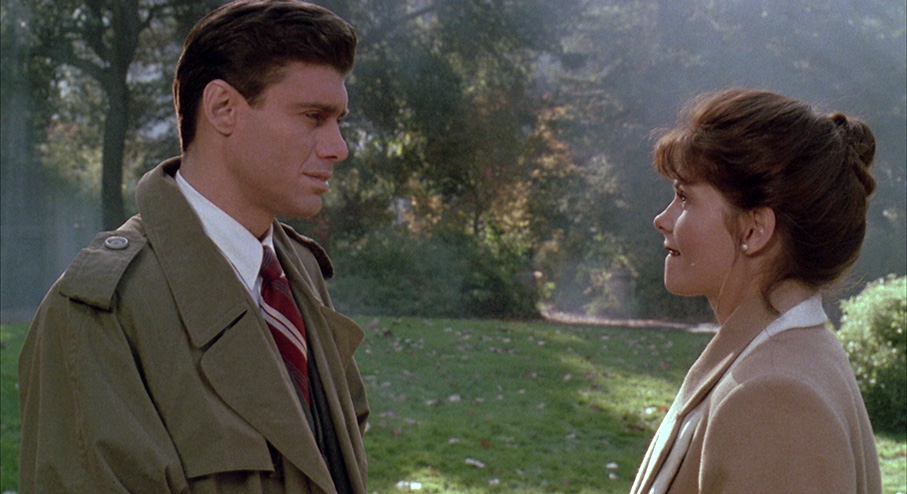
In the Director's Cut, the movie starts very differently. Lolita Davidovich plays Jenny, a married mother who is shopping in a clock store. Her 'nice' husband Carter, a child psychologist taking time off to closely parent his daughter (though we don't know this yet), leaves her to shop alone. By coincidence, she meets up with Jack (Stephen Bauer), a man she fell for when their love blossomed as Jack's wife dies in hospital - for my money the scariest scene in the movie. It's clear Jenny still has feelings for him. Jack accidentally leaves his keys in the shop and with excitement in mind rebelling against her rather safe marriage, she buys her ex a present and slips into his empty hotel room to leave it there. She meets a girlfriend in a children's playground, and confesses her interest in playing away. She also mentions odd behaviour from her 'perfect husband'. At almost exactly ten minutes in she tells her friend "Yesterday out of the blue he (Carter, the husband) started to make love to me..." and describes being interrupted by his daughter's crying and that Carter didn't attend to their daughter Amy but just mysteriously drove off. If I read my film dissolves correctly this incident is shown on screen but in the middle of a hefty twenty-two minute flashback that viewers of the Theatrical Cut will be utterly confused by as was I. Twenty-two minutes to keep remembering you're in a flashback? That's hard work for the audience. I just deleted an entire paragraph that intimated that the Director's Cut wasn't De Palma's original structure that he compromised for theatrical release at all but another structure he loved, the one that Peet Gelderblom had stumbled on that De Palma liked more and had to pay a price in small ways. Or it's all De Palma's homage to Nic Roegian flirtations with temporal structure. The scene in question makes sense buried in the flashback but it is unusual for a character to talk about 'x' and not see 'x' until later. Maybe I'm missing something really subtle. Also the flashback is clearly seen from Carter/Cain's perspective and there are scenes in the flashback he would have had no knowledge of – that's a nit-pick but a significant one if that's not a contradiction. I'm afraid I'm not covering the specific Extras where this question might be put to bed. Speaking of beds...
Handsome Jack arrives and the two take a woodland walk. The first hint that director De Palma may be playing an elaborate game with the audience is the highly stylized sex scene in the wood that Jenny suddenly wakes up from – a dream, a wish, a reality? De Palma's not telling. We stay with Jenny and it's a full twenty-two minutes into the movie (we're invested in Jenny) and we've seen super-hubby Carter on screen for maybe a minute, the guy whose head is the poster. This structure would drive screenplay gurus back to their mothers. The main character? Hardly on screen for twenty-two minutes! Outrageous. There's another anxious wake up with a lovely transition relying on stagehands pulling out a bed of leaves as soon as it's left the bottom of frame. Carter calms her down and then bang! De Palma does a Psycho on us and kills the leading lady. Now it's Norman Bates'... sorry. Now it's Carter Nix's movie.
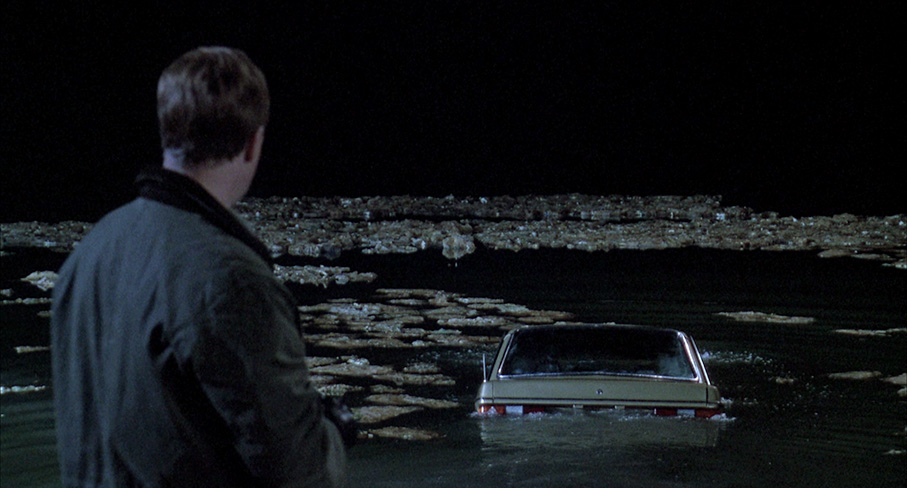
Davidovich is superb as Jenny. When dressed up, hair controlled, she's the perfect middle-class, suburban medical professional and suitably and enormously sexy. Tousled, having just woken up, she's almost feral, a rather fetching, wilder twin. She gains all the sympathy points in the Director's Cut despite her being the affair initiator. Her husband is such a schlub, too kind to be real and too bland to be cared about – which is precisely the plan. This is what makes it such a shock when he turns on her. Popping up as psychologist Lynn Waldheim, the woman who partnered Lithgow's father in writing a book on multiple personality disorder, is Frances Sternhagen. She's a woefully underused actress who does acerbic, cynical and adorable all at once. She was of course famous as Cliff's mother in the TV comedy Cheers where I first encountered her. She nails Carter for what he is and unwittingly provides him with a means of escape before the final showdown.
But despite his deliberate lack of punch in the first act, this is John Lithgow's show. For the last hour and ten minutes, he's at the centre of everything. Carter has long since faded and Cain is at the forefront, all bravado, self-confidence and psychosis. Oh, he can be scared and anxious when the occasion demands it but he's also reckless and murderous, almost casually so. We don't see too much of his other two personalities, Josh, a small, shy boy and a nanny, Margo but it really counts when we do. Nic Roeg is not the only director with a crimson-clad trick up his sleeve. Lithgow doesn't chew up the scenery as much as prepare it, season it and cook it first. But none of this matters because you sense he's having so much fun, you may as well come along for the ride. De Palma and Lithgow are not going for realism here and as long as the absurdities are noted, they can safely be shoved in a pocket somewhere and forgotten about. De Palma's oft-used composer, Pino Donaggio delivers a lush, romantic score while wildly overblown in parts, it's really effective at pushing the shocks, especially during the hospital flashback. So in conclusion, Raising Cain, the Director's Cut is a scream. Having seen the Theatrical Cut first will make you scream with frustration...
The review above was written without access to the Extra Features. While I may have modified certain sections knowing what I know now after covering most of the Extra Features, it's more authentic if I leave it as a 'knew-nothing first timer's' first impressions.
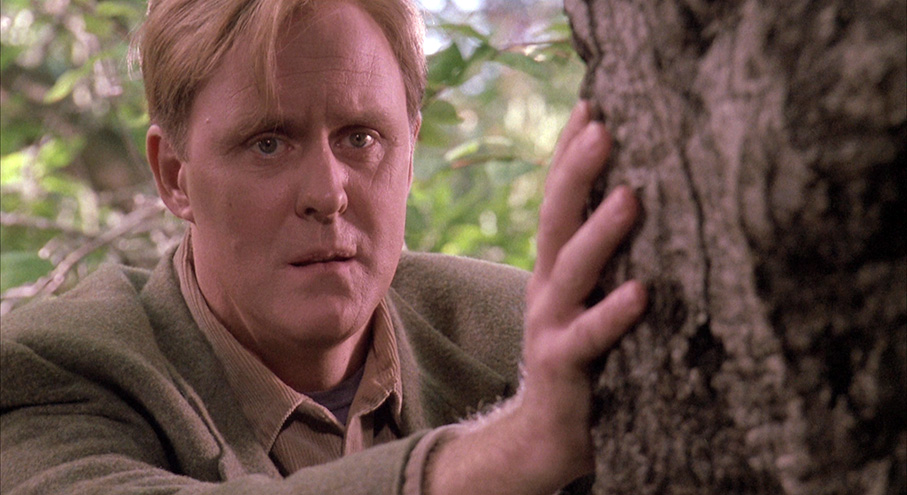
This is my John Lithgow story. In 1983, the tragedy-struck Twilight Zone: The Movie was released. George (Mad Max) Miller had directed Lithgow in the final and best segment of the four mini-stories (that's up against Spielberg, Joe Dante, and Jon Landis). Nightmare at 20,000 Feet was a re-imagining of the Twilight Zone episode featuring William Shatner as the paranoid passenger imagining that he is seeing a gremlin tearing apart the engine on the wing during a flight. It wasn't his imagination. Lithgow takes the reins and Miller does him proud. It's a wonderfully frenetic piece of filmmaking with a blisteringly urgent and terrifying score from Jerry Goldsmith and I urge you to check it out. So I'm sitting down at a London Soho restaurant waiting room reading a film magazine waiting for a friend to arrive. I note there's a picture of Lithgow as the stricken passenger looking out of the oval window accompanying the magazine's review. I go to turn the page and as the printed Lithgow wipes in front of my eyes, the real Lithgow face takes its place as Mr. J. L. himself walks out of the restaurant.
"Mr. Lithgow!"
"Yes?"
"An enjoyable coincidence?" I showed him the picture. He laughed. He suggested I go through the magazine and find someone else I'd like to say "Hullo" to. A few more words were exchanged and I sat back down, flipping the pages looking for a picture of Michelle Pfeiffer... Alas.
A pristine 1.85:1 transfer with a lovely level of detail (we're working from the Blu-ray discs in this dual format set) with pleasingly punchy contrast that nails the black levels but lets the detail in the darker areas register as well. The warm hues of the colour palette are nicely rendered, dust spots have been banished and there's a fine level of film grain that feels absolutely organic to the film image. A great job.
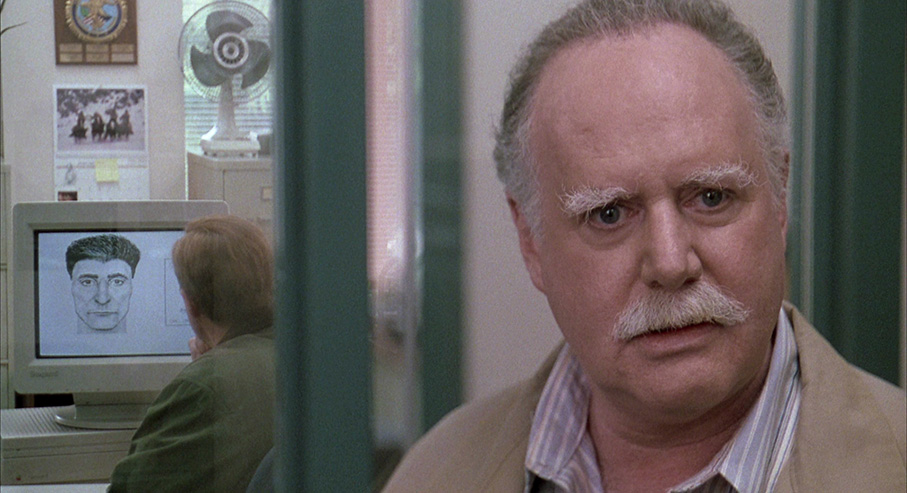
The Linar PCM 2.0 mono soundtrack is also in good shape – the dialogue, music and aven ambient sound are all clearly captured, and there's no sign of any background hiss or damage.
Optional subtitles for the deaf and hearing impaired are also available.
Hickory Dickory Dock – an interview with actor John Lithgow (15' 45")
Sporting white hair but otherwise almost unchanged since he made the film, the ever-likeable Lithgow recalls first hearing De Palma's voice when he was laughing the loudest at one his early stage performances. And so began a friendship that lead to roles in Obsession and Blow-Out and the script for Raising Cain, which De Palma wrote specifically for him. There's plenty on making the film itself, which like a number of the extras here has its share of spoilers. Amusing to hear Lithgow describe De Palma as a wonderful guy, but assure us, "He's not cuddly."
The Man in My Life – an interview with actor Steven Bauer (24' 00")
Still impossibly good looking decades after the movie's production, Steven Bauer takes us through his experience working with Brian De Palma. He notes that the director was well prepared having storyboarded the entire movie (on a computer no less) and that his direction was as simple as "Be yourself," and attract women! Bauer acknowledges Alfred Hitchcock's hold on De Palma's methodology. There's a soupçon of ego let loose here but Bauer is always engaging if a little too effusive. His present girlfriend pronounces him so hot in the movie. What else is she going to say? He describes how specific De Palma was even directing the sex scenes and how scary he thought the end result was. But this is a good Extra as it's always helpful to get feedback from those who were there.
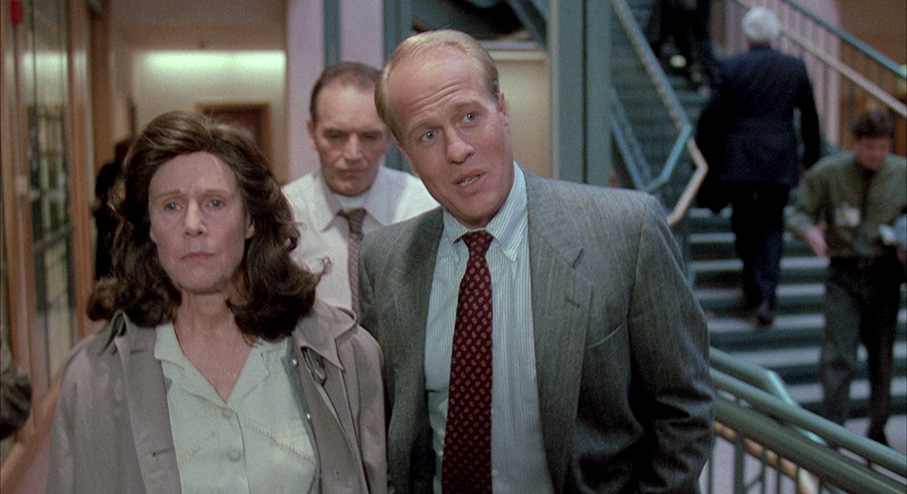
Three Faces of Cain – an interview with actor Gregg Henry (15' 47")
Gregg Henry, a familiar character actor, fills us in on his relationship with De Palma (a one line reading getting him a role in Scarface). For Cain, De Palma actually called him, no audition. He also played Cain's multiple personalities to give Lithgow more than his imagination to act against. He also makes the point of the actors needing to know "What reality were we in?!" He talks amusingly about the poor mortuary attendant actor who had to deliver his one line after the multi-minute Steadicam shot – talk about pressure. After thinking hard about where I'd seen him recently, I gave up and cheated. He was the grandfather in the first scene of Guardians of the Galaxy.
The Cat's in the Bag – an interview with actor Tom Bower (8' 00")
Here is another one of those dependable American character actors who create memorable performances out of very little. His IMDB page is ludicrously long and he's guest starred in all the major US TV shows throughout his life. I remember him most as Marvin, the janitor giving Bruce Willis a few good ideas in the sequel to Die Hard. He too mentions the difficulty of the long Steadicam shot and also says he was picked out for praise in Raising Cain by none other than Pauline Kael, the doyenne of film criticism at the time.
A Little Too Late for That – an interview with actor Mel Harris (8' 43")
Harris takes us through the straight forward audition and tells of her reaction to the script, "a page turner..." She gushes about De Palma who also shows the actress a personal side as he had just had a baby. Another gush about her co-stars, happy set stuff which is usual PR puff but some of that has to be true and Harris seems to be open and amenable. I have to admit that I asked the same question that she did in the scene with Lithgow playing his own father... "Is that Lithgow?" Nice.
Have You Talked to the Others? – an interview with editor Paul Hirsch (10' 49")
Ah! An editor's take, always useful! Hirsch is hugely famous in genre circles as the editor of the original Star Wars. He has done eleven movies with De Palma. After a stint at Fox 'rescuing' bad movies, he jumped ship to work with De Palma again. He read the script and his reaction was "What? What?!" as he was completely confused. The two most important rules of editing are pace and clarity, aspects this movie slapped in the face a few times. Hirsch qualifies the 'De Palma rips off Hitchcock' argument with the counter that they are similar people (sadists with a sense of humour, nice!). Hirsch's insights are always valuable and with a twinge of regret he says that De Palma is a bit of a recluse now but that the role he played in Hirsch's life was extremely important. Touching.
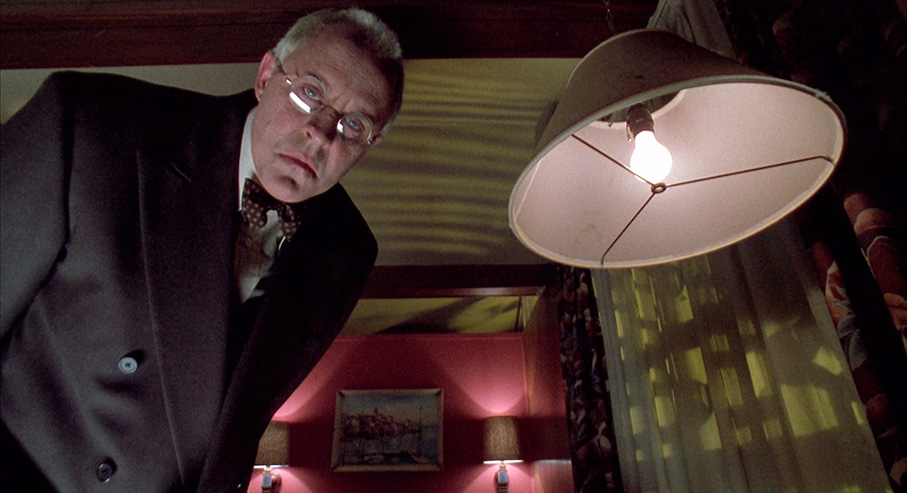
Raising Pino – a brand-new interview with composer Pino Donaggio (35' 46")
De Palma's favoured composer takes us through his past in Italy in this Italian–with-subtitles interview. Steeped in music from a family standpoint, Donaggio got his first recording contract as a singer at the age of seventeen. He wrote what we know of as 'You Don't Have To Say You Love Me' which has been covered an absurd number of times. I'd completely forgotten his first score as a young singer/composer was for Roeg's Don't Look Now. Of all people to act as translator between director and composer, it was Italian-speaking Paul Hirsch, the editor. He goes through his relationship with De Palma and notes how meticulous the director was (wanting a few piano notes changed for the end sequence and flying to Italy to oversee such a small change). Maybe he just loves Italy. Donaggio, with no discernible lack of ego, charts the role of film scores and elevates them to where I expect them to be. Up there with modern and classical music.
Father's Day – a brand-new video essay about the multiple versions of 'Raising Cain' by Chris Dumas, author of 'Un-American Psycho: Brian De Palma and the Political Invisible' (23' 26")
Chris Dumas' presentation delves deeper into the evolution of Cain, its Theatrical and Director's Cut (and all the screenplay stages in between). Like any creative endeavour there are multiple lanes off the main roads and what De Palma was attempting is made more complex by his initial choice to not give the audience an easy temporal or dramatic experience. Dreams within dreams, yesterday's tomorrow etc., unreal characters, the dead coming back to life, a real smorgasbord of invention which mainstream Hollywood and the audience could not be expected to handle. I just wish I'd seen the Director's Cut first. Don't make my mistake.
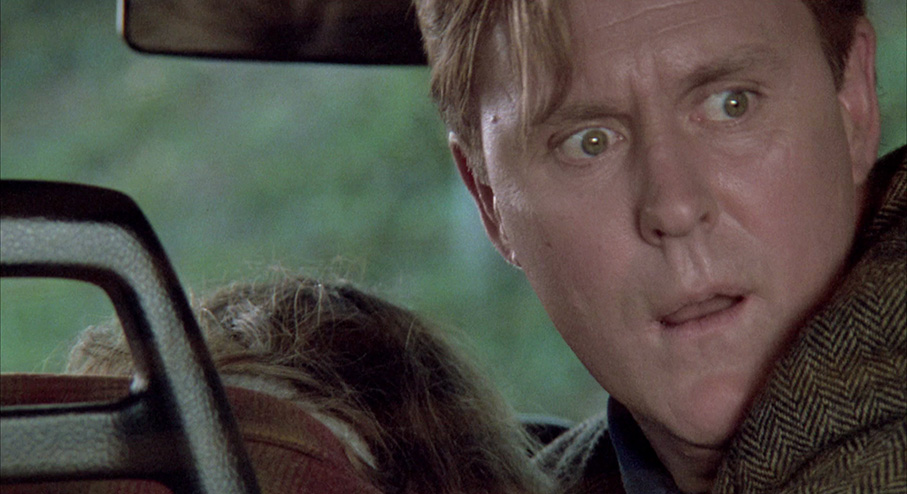
Gallery (02' 00")
A rolling gallery of production stills and posters, set to Pino Donaggio's score.
Theatrical Trailer (02' 05")
A cropped 4:3, standard definition trailer that moves at a lick and should leave newcomers to the film wondering just what is going on. Changing Cain: Brian De Palma's Cult Classic Restored (02' 25")
Peet Gelderblom outlines how he came to recut the film to match De Palma's original vision for it, and how De Palma himself gave his stamp of approval. This is designed to be an introduction to the Director's Cut and was recorded to accompany Shout Factory's US Blu-ray release. Raising Cain Re-Cut – a video essay by Gelderblom on the origins and differences of the Director's Cut (13' 02")
Mr. Gelderblom is clearly having fun here, elevated to essentially De Palma's champion by his work. Smartly editing his voiceover to relevant images from the film, you know you're in good hands when you see his words "...screwing around" and "...look away" within the first minute are literally illustrated and this sort of thing usually raises a smile from me. When Gelderblom talks about a transition he had to make, he mentions that he took a shot from the Theatrical Cut's opening and stabilised it before repeating the last part of the conversation between Jenny and her friend Sarah. As we cut from one to the other, the editor in me spotted something odd.
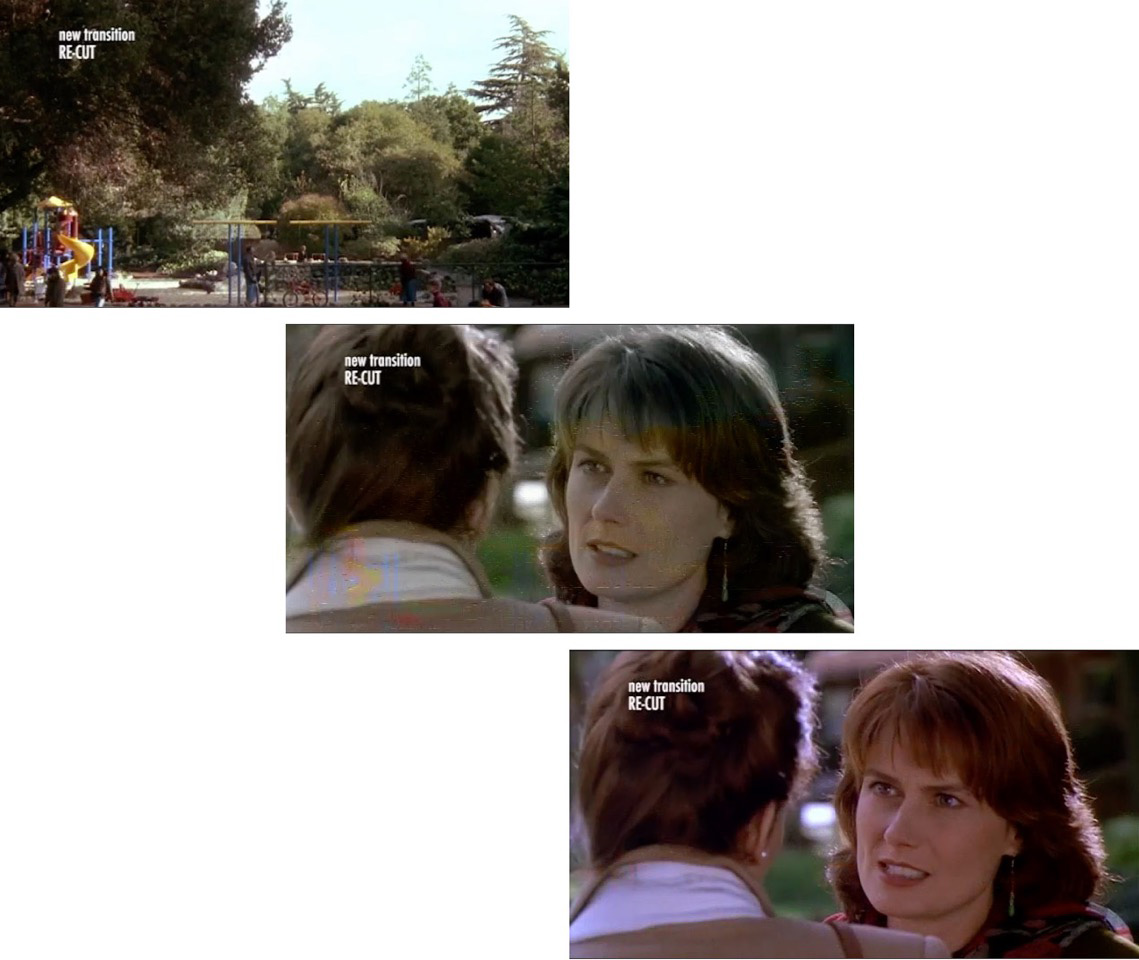
There's a rogue frame so we are probably seeing his original cut rather than the cleaned up Director's Cut. I checked. The rogue, badly damaged and ungraded frame is not in the Director's Cut. But all this is largely irrelevant. As Peet Gelderblom says, it's up to us, the audience to say whether the Director's Cut works better than the released cut. I'm on his side. Raising Cain inches forward towards great De Palma on every viewing...
Also included is a Booklet featuring new writing on the film by Anne Billson, but this wasn't included with the review discs.
De Palma in full flow and Lithgow having the time of his life make this a must-see for fans of either, and if that includes you then this is the package you've been waiting for. Great transfer, an impressive collection of worthwhile special features and the Director's Cut of the film, which really is the one to go for here. Arrow score again. highly recommended.
* http://www.directorama.net/2016/07/26/changing-cain-fan-edit-brian-de-palma-directors-cut/
|